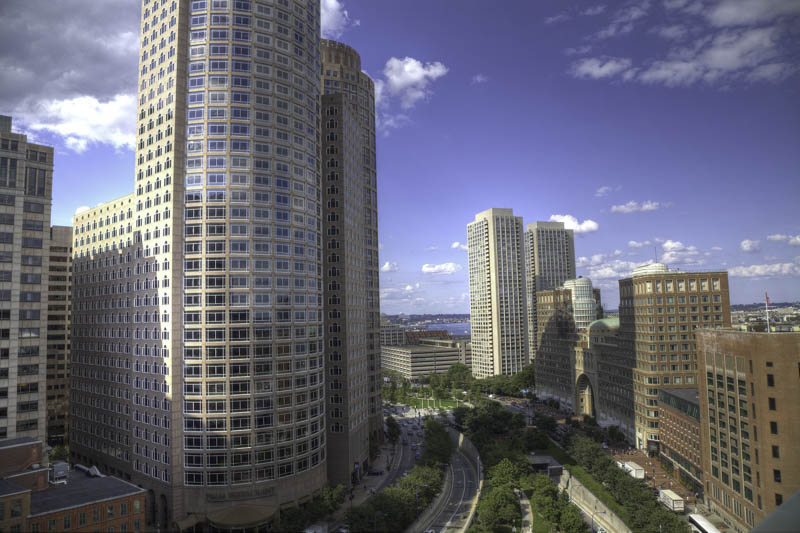Home » Cost Guides » Massachusetts Cost Guides » How Much Does it Cost to Build a House in Boston?
Just a stone’s throw away from some of the most renowned universities in the world such as Harvard and MIT, Boston is considered a center of scientific research. The city is a pioneer in innovation and business, home to nearly 5,000 startups and corporations across the finance, biotechnology, and information technology industries.
The Cost of Building a Custom Home in Boston
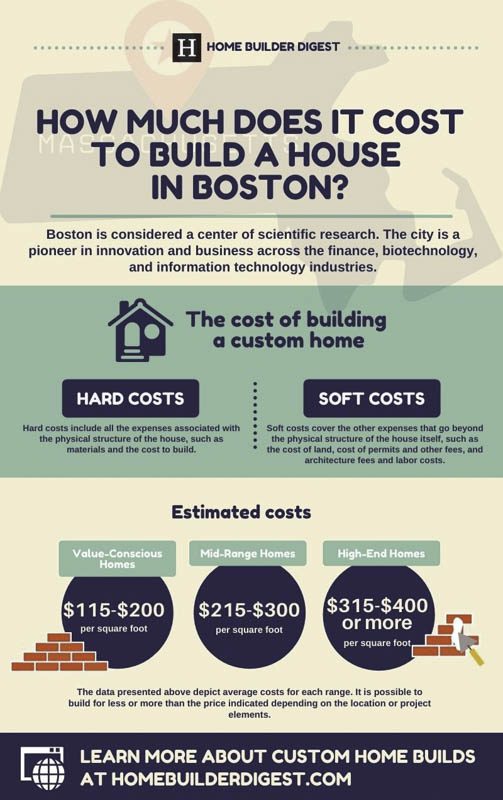
In the face of pandemic restrictions and industry shutdowns, construction in Boston has managed a steady growth over 2021, with residential construction increasing by 23.2%. However, the effects of COVID are expected to be felt more strongly in the market in 2022, with a decline of a little over 2% in growth predicted each year moving forward.
Builders have already felt the impact of price hikes and supply chain issues caused by the pandemic. Today, the cost to build a home in Boston averages at around $260 per square foot, with luxury homes starting at about $350 per square foot. The national average is around $200 per square foot.
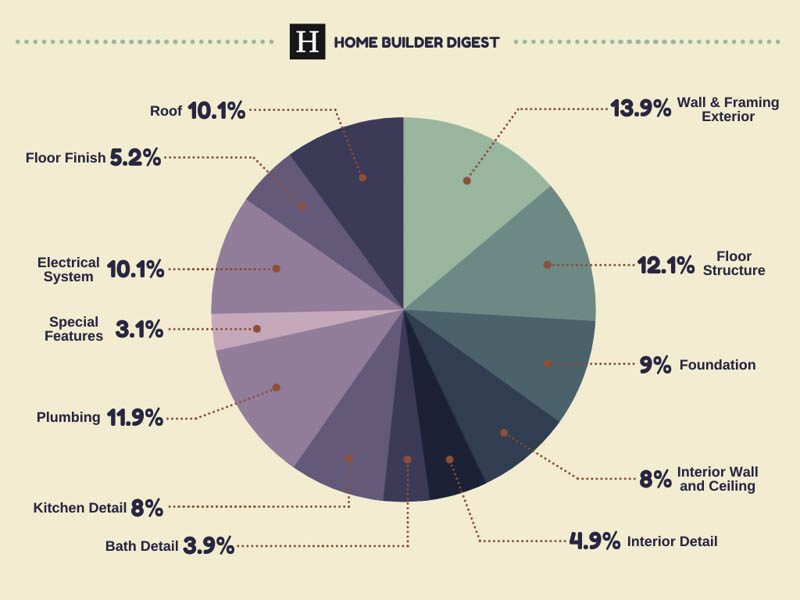
Figure 1. Typical cost breakdown of a single-family home constructed using the conventional method, according to Home Builder Digest. Image Source: National Cost Guide.
Specific costs tend to vary per city based on several factors that can be classified into two categories: hard costs and soft costs. Hard costs include all the expenses associated with the physical structure of the house, such as materials and the cost to build. Soft costs include the cost of land, permits and other fees, and architecture fees and labor costs.
Hard Costs
Hard costs cover the cost of constructing the home itself. Data gathered from online contractor marketplace BuildZoom (BZ) shows that the cost to build a home in Boston starts at around $115 to $200 per square foot for the value-conscious range. The mid-range is at about $215 to $300 per square foot, while a high-end home goes up to $315 to $400 and beyond.
Mathew Roth, co-founder and owner of high-end custom home building firm Hawthorn Builders, is seeing most new construction pricing between $350 to $400 per square foot and above depending on style and finishes. New England Design and Construction CEO David Supple also says the firm’s new design-build homes start at $400 per square foot, inclusive of the cost to build kitchens and bathrooms.
Homebuilders also report material costs have increased an average of 26.1% from 2020 — the largest single-year jump in the National Association of Home Builders’ (NAHB) survey. Lumber costs alone added almost $36,000 to the cost of building a single family home. These costs have been highly volatile over the year, but the latest Producer Price Index (PPI) report from the Bureau of Labor Statistics shows that the prices of most goods used in residential construction climbed 0.8% in October 2021. Specific noteworthy increases include softwood lumber (9.1%), ready-mix concrete (0.6%), gypsum products (2.1%), and steel mill products (4.8%).
Soft Costs
Soft costs cover the other expenses that go beyond the physical structure of the house itself, such as the cost of land, cost of permits and other fees, and architecture fees and labor costs.
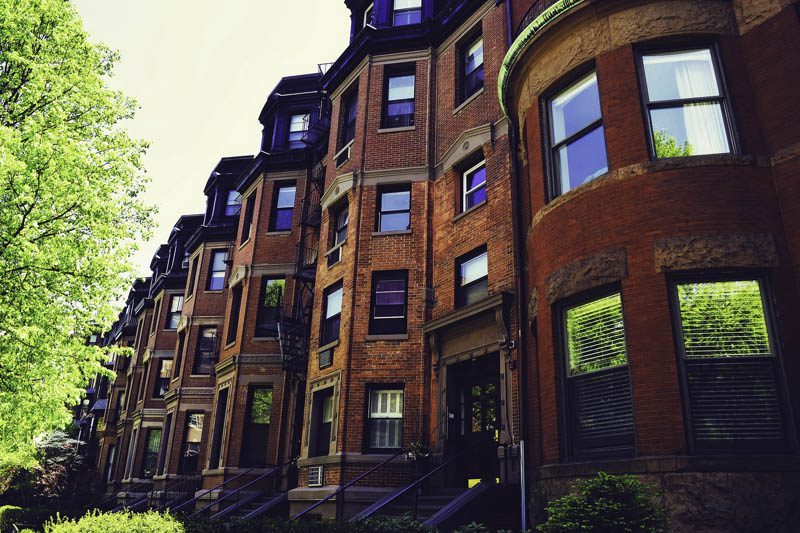
Cost of the Land
Online home-buying and selling platform Orchard lists Massachusetts as among the most expensive states to buy land at $102,214 per acre.
Boston listings on Zillow average at $1,670,332 or $230 per square foot. This includes a listing starting at $200,000 for a 2,709-square-foot lot in a 3F-6000 subdistrict allowing a semi-attached dwelling or row/townhouse for up to three families on-site. This property will still require the Zoning Board of Appeals’ approval for building, but the Boston Planning and Development Agency (BPDA) has been assessing it as residential land since the mid-’80s. It also includes a listing going up to $8 million for an 11,325-square-foot lot, which is a minute away from the New Balance world headquarters in an area with tremendous development potential for residential and mixed-use properties.
On Redfin, prices average at $971,249 or $197.75 per square foot. The highest listing, valued at $5 million for a 3,285-square-foot parcel, can accommodate approximately 20,000 square feet of gross building area over multiple floors, including lower-level garage parking.
On Landwatch, listing costs average at $1,437,944 or $219 per square foot. This includes a $2,250,000 listing for a 3,951-square-foot property in a convenient location near Carson Beach and many shops and restaurants in South Boston.
Local zoning rules tend to be of specific concern in Boston, so it would be good for anyone moving to the area to get familiarized to know what to expect when starting a project.
Permits and Other Fees
The City of Boston Inspectional Services Department differentiates between long-form buildings, which include new construction and major alterations, and short-form building, which covers minor alterations. According to its fee schedule, long-form building permits for one to three-family homes have a primary fee of $50 plus $10 per $1,000 of the estimated cost of work. Working with sheet metal will incur a primary fee of $20 plus $25 per 1” 200 linear or square foot. For plumbing, the primary fee is $20 plus $5 per fixture. Installing new electrical service will incur a $200 application fee plus $0.25 per amp up to 240 volts or $0.75 per amp over 480 volts.
Many homeowners would also need to take out a new construction loan when building their home. Private lending network resource HardMoneyHome.com says there are 49 records for new construction lenders in Boston. The mean amount loaned for new construction in the city is $290,835. Interest rates average at 12.4%, while the average term offered for notes is 11 months, and the average origination is 3.4 points. The average loan-to-value offered is 73%.
As of fiscal year 2020, Boston’s residential tax rate was at $10.56 for every $1,000 of value.
Architecture and Design Fees
Massachusetts-based firm Aamodt / Plumb says architects’ fees typically range from 10 to 20% of the final construction cost for residential projects. Final construction cost is not just the total project cost but the sum of hard costs and soft costs. However, at the start of the project, as the designs are still being drawn up, the architect may opt to charge an hourly fee while that cost is still being estimated. They may also charge an up-front retainer fee to begin the work.
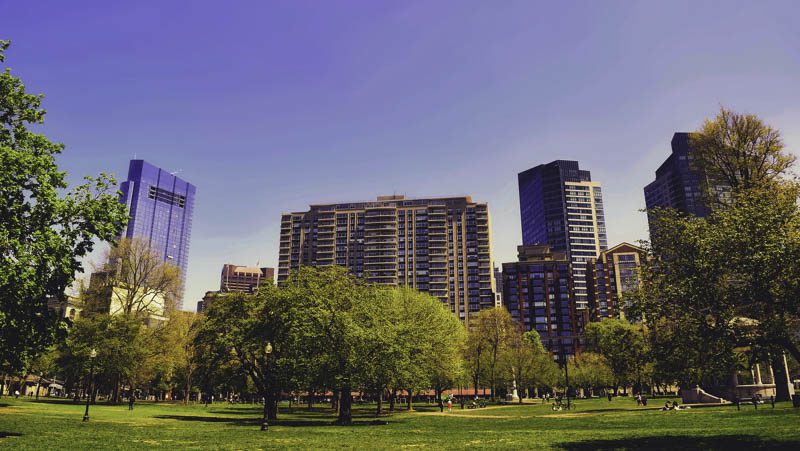
Boston Building Resources adds that the architect fee is typically broken down into the five phases of the design process. Schematic Design, which is where the architect draws up the initial plans based on the client’s vision and needs, will make up about 15%. Design Development, where the relationship of the different parts — plumbing, electrical, structural, window and door openings, product selections, etc. — is more closely defined, makes up about 10%. Construction Documentation tends to make up the largest part of the fee, about 40%, as this is where the drawings are finalized and integrated with input from other consultants, resulting in a map that includes materials, dimensions, connections, details, and product specification. The completed construction document set will then be the basis for the Bidding Phase for contractors, which makes up 5% of the architect fee. And finally, Construction Administration, where the architect works closely with the builder to ensure the original vision is built, will make up around 30%.
On the building side, employment in the Boston construction industry has mostly recovered, with the unemployment rate down to 6% in 2021 from 8% the previous year.
How do the custom home building costs in Boston compare to other nearby cities?
Based on permit data from the last five years gathered from online contractor marketplace BuildZoom (BZ), the cost to build a home in most nearby areas tends to fall within the mid-range cost to build in the city of Boston itself. The average cost to build a home in Cambridge is $555,363, starting at $170,000 and going up to $3,395,000. For Somerville, the cost to build a home ranged between $430,300 and $528,300. For Arlington, the cost to build a home averaged at $404,130, starting from $115,000 and going up to $3 million.
For Brookline, however, the average is a little higher, at $645,616, with job costs starting at $470,000. Alberto DeJesus, CEO of DeJesus Industries also gives a higher estimate for building in the area today. “High-end new construction in ritzy towns such as Brookline, MA will run upwards of $1,200 per square foot.”
What Leading Custom Home Builders and Architects that Serve the Boston Area Say
The DeJesus Industries CEO also says the construction industry is projected to remain strong into 2022 in both residential remodeling and high-end new construction. “According to a study released by our neighbors at Harvard University, home remodeling spending is expected to increase in 2022 by as much as 8.6%.” He adds that the cost of construction is increasing, along with everything else, as a result of inflation and the demand for skilled labor. DeJesus advises would-be homeowners to “buy or build new if possible and get educated as much as possible before engaging in any construction projects so you can better prepare and understand its logistics.”
Hawthorn Builders co-founder Matthew Roth also says the Boston market remains fairly tight. “Project delays, rising prices, and supply chain issues (and who knows what other issues are lurking) could cause issues, but the short term i.e. 6 months to a year seem ok.” He also says that building a new home always starts with having a good plan and finding trustworthy and competent people that can execute that plan.
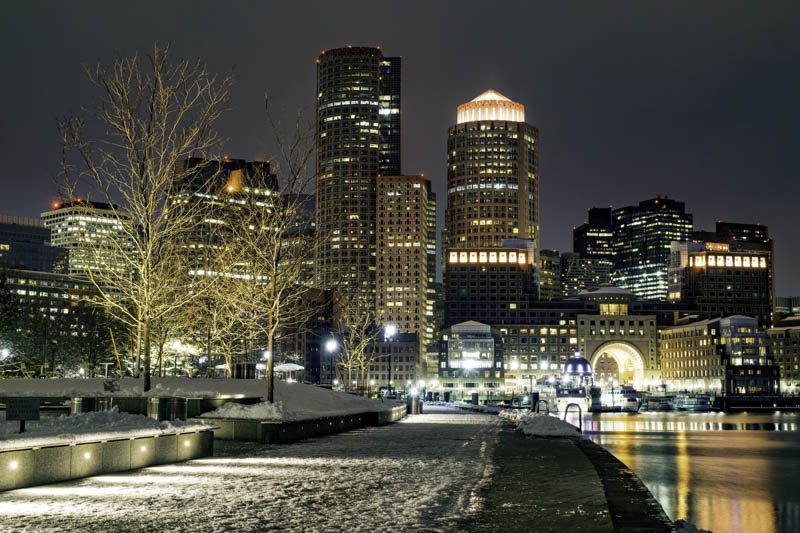
For New England Design and Construction, the mid-range cost to design and build a home in the city, including the kitchen and bath, is about $650 per square foot, while the high-end is around $1,000. CEO David Supple observes that the rapid increase of material costs over the pandemic has already plateaued and materials and finishes are becoming more readily available. He thinks that as things are slowly returning to normal, costs will now go back to the previous levels of steady increase at a slower rate than in the last two years.
“Many people are remodeling their homes now that so many of us are primarily working from home, so demand for construction services continues to be high, and I imagine we [will] see that trend continue for years to come,” says Manhoff. He advises project owners to carefully define what they need in their home to make it work for their lifestyle and to ensure that the company they work with is able to provide creative, efficient, and sustainable solutions to deliver the ideal space while setting a cost expectation as early as possible.
Howell Custom Building Group co-founder Susan Howell also observes an unprecedented demand for both the remodeling and new construction industry due to people spending more time at home. “They want to make changes to accommodate this new lifestyle. Sometimes this is to do projects they’d previously delayed, or it’s because their needs have changed due to working from home, eating out less, no longer traveling for vacation,” she says. “There are many requests for improved office space, finished basements, expanded and remodeled kitchens, and luxurious outdoor living spaces. There have also been a lot of people moving to new homes that they want to renovate, or buying land and building new homes (both primary residences and vacation homes).” Howell says this extraordinary increase in demand has resulted in the largest backlog of projects the firm has had in the 25 years since they started their business.
This unprecedented demand in the midst of supply chain shortages and delays has raised the cost to build a home in Boston today. “Unfortunately building costs have increased 25% in aggregate over the past two years since the pandemic started. The biggest increase has been in the cost of materials, though we’ve also seen rising prices for subcontractors and labor,” says Howell.
The custom home building firm doesn’t typically offer square foot pricing for the one-of-a-kind custom homes it builds because it can tend to be misleading, as each home is unique in its complexities. “A two-story colonial can be less expensive to build than a similarly sized rambling ranch with a lot of angles; a hilly site with ledge is more costly to build on than a flat, sandy lot,” explains Howell, adding, “the cost will be driven up by custom trims, built-ins, high-end kitchen appliances, and plumbing fixtures, etc.” However, she also shares of hearing other industry professionals who build architect-designed, unique custom homes using an initial budget estimate of about $400 per square foot as they begin to get a very rough idea of what a homeowner might want.
The Future of the Boston Residential Construction Industry
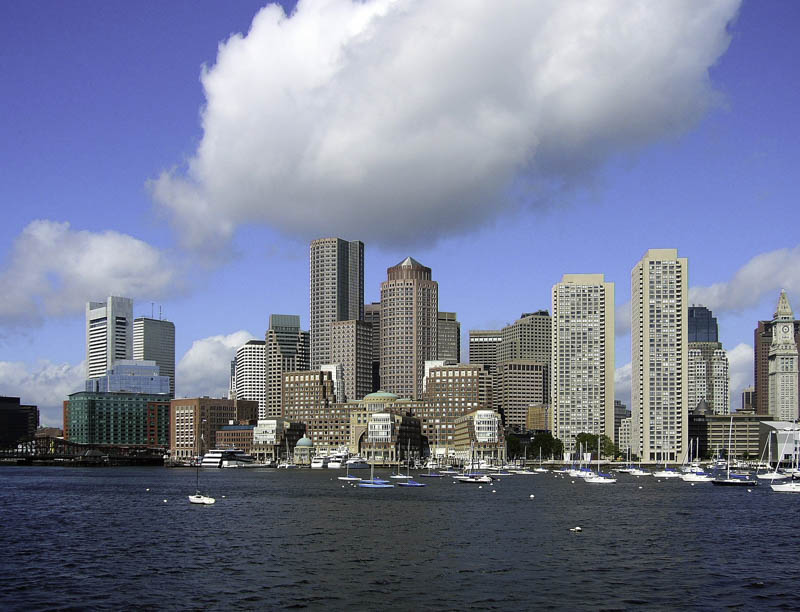
Despite Boston being one of the last to lift pandemic restrictions and a lot of industry shutdowns, the increased demand for new houses from more people staying home has given residential construction the highest percentage of growth among the city’s construction industries, at 23.2%. However, the anticipated slump is expected to be felt quite severely in the next two years, with a decline of -6.3% projected for 2022, and -4.9% in 2023.
Supply chain issues have pushed the cost of materials up and protracted lead times, doubling or tripling to 12 weeks for custom windows and taking upwards of sixteen weeks for plumbing fixtures. Appliances have had the longest lead times, with industry leaders suggesting they be ordered at least six months ahead of time and anticipating things may not settle down till as late as 2023.
Affordable Housing
The availability of housing is a challenge facing Boston’s leadership. Of nearly 36,000 apartments and condominiums permitted, more than 7,000 have been set at rent prices to cater to lower- and middle-income residents, increasing Boston’s housing stock by about 13% in a decade. However, housing advocates say this is still not enough to preserve the city’s vanishing middle class or provide opportunities for first-time homebuyers.
Some homeowners are also considering building their own prefabricated modular houses as a more controlled way to navigate the current crazy home market and its bidding wars.
Meanwhile, in nearby Cambridge, Squirrelwood Apartments, an affordable housing community, is among two landmark projects seeking Passive House certification.
Mass Timber Accelerator Program
The BPDA and the Boston Society for Architecture (BSA) have also recently launched the Mass Timber Accelerator to promote the use of mass timber by the local building industry, aiming to help Boston reach its goal of carbon neutrality by 2050. The program includes a traveling visual exhibit called the Think Wood Mobile Tour which showcases the environmental and economic benefits of wood products and their current and future use in commercial, multifamily, and residential construction. Single family homes are among the interactive building models included in the exhibit.
Considering building a home in Boston?
Contact us for a free consultation

